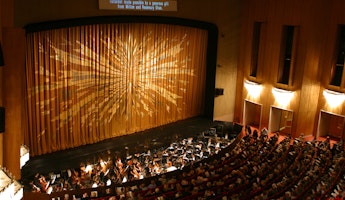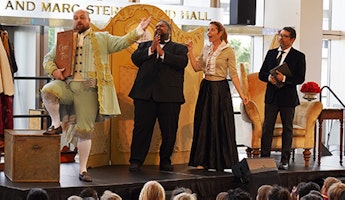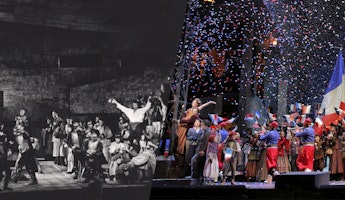Blog
January 26, 2023
Getting to Know Our Figaro: Craig Colclough
Starring as Figaro in this season's new production of The Marriage of Figaro, SoCal native Craig Colclough began his career at LA Opera, performing a series of supporting roles before moving on to leading roles both here and in the world’s top opera houses. We caught up with him in a break between rehearsals to talk about his early experiences in Los Angeles, his big break and what drives Figaro.
You made your LA Opera debut in 2008 in the bit role of Guccio in Gianni Schicchi.
It was an epic moment to have that first experience be with a household name movie director [Woody Allen] and one of the most famous baritones whom you’ve studied on recordings, Sir Thomas Allen, and a killer all-star cast. “Is this happening? Am I here?” I was scared out of my mind, with my seven syllables that I sang. I had so far to go and so much to learn at that point.
It must have gone well, since you were invited back regularly.
My most magical memory of that time was when I played the Sergeant in The Barber of Seville with Juan Diego Flórez. Everybody’s on stage. It’s the big finale. And I’m the little soldier in the back, watching his breath support as he went through these insane runs....and getting paid for it, with the best seat in the house. I thought “If this is all I do for the rest of my career, I’ll be happy.”
Your big break came at English National Opera in 2014, as Jack Rance in The Girl of the Golden West.
I sang for John McMurray [ENO's head of casting], possibly in this room. He was here hearing the Young Artists at the time and I was in the area and very politely asked if I might pop in and sing for him as well. I really needed to expand to Europe in order to progress, to take that next step.
We immediately got along very well and he was responsive right of the bat and asked about Rance, which I did not know. “Sounds great. I‘ll take it!” And then, after looking at the role, I thought "this is fricking awesome. This is exactly what I should be doing." So ENO was my break.
After a couple more things at ENO, I did Kurwenal in Tristan und Isolde there, which was when everything ramped from B house to A house. It was an incredibly challenging production and an avant-garde staging, and Act Three was really well received. The general director of Opera Vlaanderen in Belgium heard me. They have a particular emphasis on drama, on the acting side of opera. That was my path, that was my “in,” coming from a theater and comedy improv background. Some opera singers will find favor with a great conductor. My "in" to the higher level was through the directors, through stage directors seeing that I am here to play. I am here to throw myself completely into this, to crawl through a pile of blood, to go up and down walls, to go mad, to cry on stage, the full spectrum, and not to just stand there. That Tristan und Isolde was really the proving ground for that, that got me the bigger attention.
Is this your first Figaro?
No, I did it a few years ago in Atlanta. I wasn’t really ready. In 2015, I did the Count role here in ¡Figaro! (90210) [a contemporary update, presented as part of the Figaro Unbound festival]. And I just sang Bartolo at Pepperdine University. I was teaching there and I sang Bartolo with them onstage with the students. So, I’ve definitely been through the piece from all the different points of view. Maybe before I retire, I’ll sing Antonio too!
What makes Figaro tick?
Figaro, at this point in his life, has become a staple of the community. He has a position that is highly elevated: he is the head servant. If you’ve seen Downtown Abbey, you know there’s even a hierarchy even among the lower classes. So he started out as a kidnapped orphan and has leveraged his intelligence all the way up to this position. He thrives on the affirmation of the community, and he prides himself on his intellect. In The Barber of Seville, that’s his primary function. He, as a lower-class person, is necessary to the upper class because of his intelligence. And that’s the political flip.
In The Marriage of Figaro, it is the women who dominate the men. In his falling in love, in finding his intellectual equal in Susanna, and opening himself, that’s where he becomes lost. This is a situation and a vulnerability that he’s not used to. He’s used to constructing his biome and being the master of his fate. By opening himself, maybe for the first time in a decade, he has become lost and scared. So it’s that plus a history of confidence with the Count, but also his vulnerability to the Count due to his position. He’s wedged in a tight spot in a very short timeframe of getting married in a single day, having discovered this plot in the morning.
So it’s a lot of pressure, but I think the reason that Figaro is so enjoyed by the audience is because he manages that pressure so elegantly. You sympathize with his danger and then you feel victorious with him at each moment of overcoming, at each moment of outsmarting and success. He brings the audience along through this portal of suffering in order to earn success at the end. He pays a certain penance, when Susanna tricks him, for his failures, for the amount of lying he’s had to do through his life, and by her besting him and by her punishing his short-term lack of faith. When he does finally break, there’s a kind of atonement for this one time that he’s finally failed her, where he’s finally slipped up.
It’s a tricky balance in this piece and it’s a very human balance. We’re always pulled in two directions. We’re sincere, we’re scared, and we’re compensating. We're competent, but we’re also failing. It’s a wonderful, diverse picture of very complicated people trying to survive and make it and everyone being fallible. It’s delicious.








/03-cosi/_dsc0996_pr.jpg?format=auto&fit=crop&w=345&h=200&auto=format)















